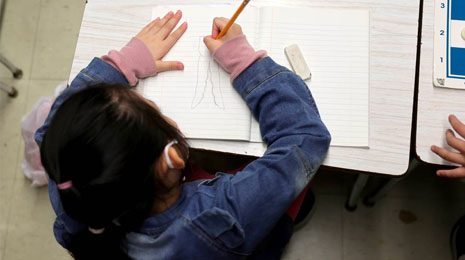
Originally published in Military Times, October 24, 2022
Military leaders have repeatedly raised concerns about the quality of K-12 public schools around military installations.
At an Association of Defense Communities annual forum, Gen. David L. Goldfein, then Air Force chief of staff, called it the number one issue for airmen. Gen. Charles Q. Brown, the service’s current chief of staff, has done the same. In fact, in 2018, then-Air Force Secretary Heather Wilson stated that education quality would be a factor in strategic basing decisions. The rest of the forces have been mandated by Congress to follow suit.
Why is education quality in elementary and secondary schools a matter of national force readiness? It’s because highly talented professionals with specialty jobs have been leaving the forces due to the less than stellar quality of K-12 education that their children receive around their assigned duty stations. That rate of departure has been significant enough to erode national security.
The average military family can move as many as nine times during a child’s 13-year K-12 school experience. In addition to the typical stressors associated with moving, military children often encounter different curricula and pedagogical approaches as they transition from school to school. Gaps in education are all too often the result.
As the former superintendent of a district where 75% of students are military impacted, I’ve spoken to commanding generals who say that school transitions can be such a gamble that education is one of the top concerns for military families when they’re considering settling in a particular community.
Solution: Third-party review, accreditation
This matter concerns me not just as a district superintendent but also as the Missouri state commissioner for the Military Interstate Children’s Compact Commission, or MIC3, which resolves school transition issues for children of service members. I believe the way to address this issue is a standard of quality assurance and continuous improvement that’s similar to the process for Department of Defense Education Activity, or DoDEA, schools but that’s geared for public school districts that serve military families.
Certainly, the armed forces understand the concept of a third-party review and quality assurance. An external third party that deals with different states as well as overseas education institutions brings a breadth of perspective that district leaders, who only know about their own procedures, can’t duplicate.
That’s why my district, Waynesville R-IV, went through the accreditation process offered by Cognia, a nonprofit, nongovernmental organization that focuses on continuous improvement and accredits primary and secondary schools globally. Having an external entity analyze what’s being done in a school system can provide a clearer perspective regarding areas for improvement and future actions.
A worldwide standard of quality
The organization we worked with, Cognia, accredits and reviews DoDEA school districts and serves public schools near 90 DoD installations across 23 states. Many service members from different parts of the world are already familiar with it as a quality designation. That third-party endorsement provides a level of assurance to parents who really loved the school their child attended in another country, for example, and are now returning stateside. While the new school may be a long way away from the country they just left, the accreditation lets the family know that it has a similar mindset. They can expect a similar vision, a similar level of expectation and, thus, similar outcomes.
In addition to reassuring parents, accreditation helps students who are ready to go on to college. Those students may go to a foreign college that requires certification, or they may be returning stateside. In either case, postsecondary colleges and universities will look for accreditation such as certified school transcripts and a diploma. That’s especially important for U.S. universities that may not have a lot of experience working with military kids. When those universities see that the overseas school has an accreditation they recognize, it facilitates the process for those students.
Military impacted districts are unique places, and I’ve loved working with military kids. But in such districts, leaders need to reach out beyond their state to see what’s going on across the world. A quality assurance process can provide teachers and district leaders with the reliable, unbiased feedback they need to make that a possibility.
As the MIC3 state commissioner and a district superintendent, I’m hoping to see quality assurance processes revitalized throughout military school districts. Developing increased consistency in practices and expectations in our network of military school districts is extremely important to improving educational quality for military kids. Knowing that a public school district that serves military families has gone through a process of accrediting and verification just as DoDEA schools do will be a huge comfort to military parents.
Dr. Brian L. Henry is the former superintendent of Waynesville R-IV School District in Missouri and Missouri State Commissioner for the Military Interstate Children’s Compact Commission.